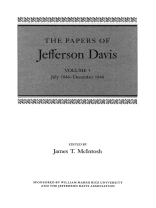Lynda L. Crist, Associate Editor
Mary S. Dix, Assistant Editor At the end of Volume 2 Jefferson Davis had left Congress to become a colonel in the First Mississippi Regiment. The first item in this volume is a speech as he prepares to leave on a riverboat to serve in the Mexican War. The years 1846 through 1848 see Davis play a conspicuous role in the war and in the subsequent political clashes and controversies over slavery.Volume 3 details Davis‘ first experience in battle as an officer of a regiment as well as his initial term as a U.S. senator. He received both praise and criticism for his leadership in Mexico. In 1847 he returned to Mississippi a wounded hero of national fame, refused a brigadier generalship, and took his place in the U.S. Senate.There are several items of correspondence with Zachary Taylor that shed light on Taylor’s attitude toward the proposed nomination that would lead to his election as president in 1848. Davis‘ first wife was Taylor’s daughter; and in spite of political and family differences the two men maintained a close friendship. In a major speech in July, 1848, Davis protested the formal prohibition of slavery from the Oregon Territory; he then voted for the Senate’s compromise bill on Oregon.Volume 3 of The Papers of Jefferson Davis includes letters to and from Davis, his speeches in chronological order, and other documents, further illuminating Davis‘ character, opinions, philosophy, and personal relationships as well as continuing the development of his military career.
Über den Autor
James T. Mc Intosh was editor of The Papers of Jefferson Davis from 1970 to 1979.












